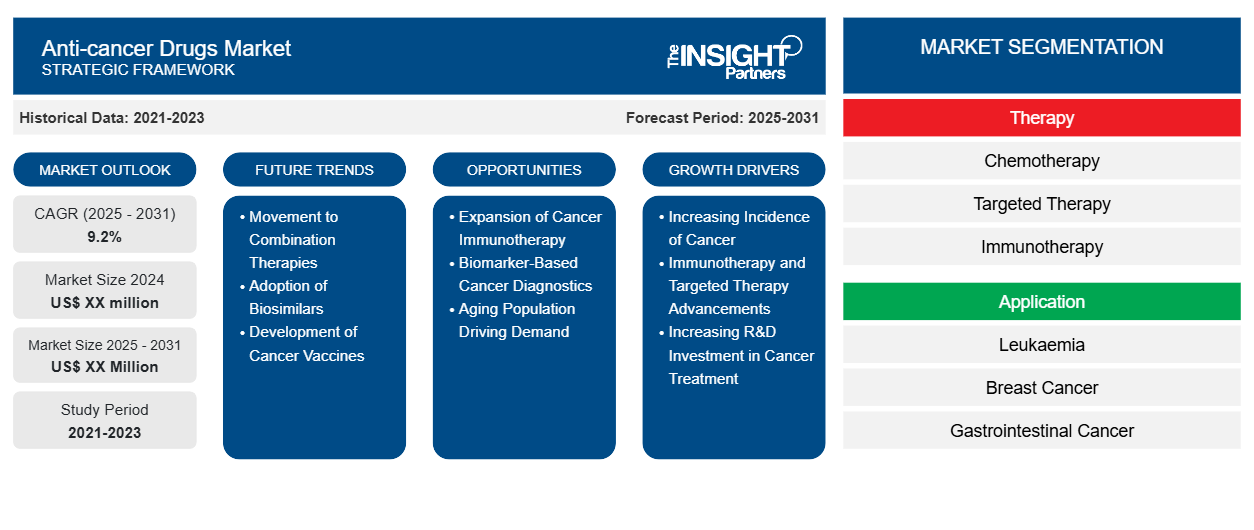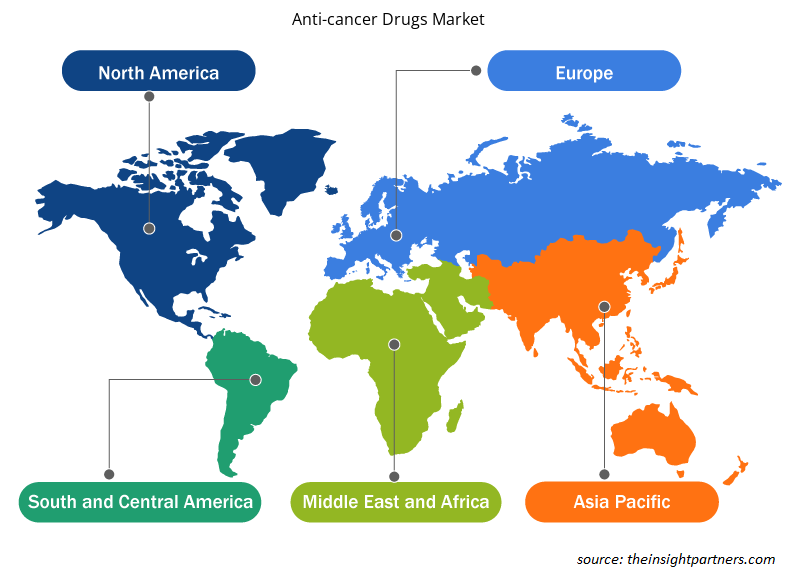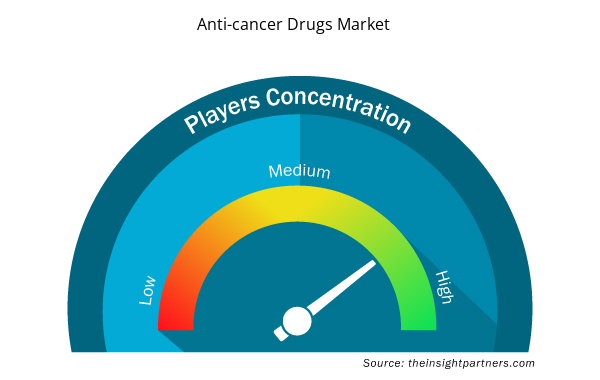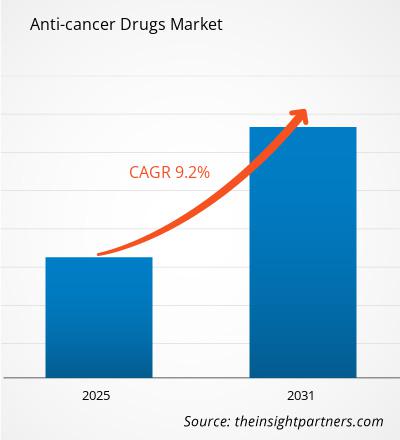The Anti-cancer Drugs Market is expected to register a CAGR of 9.2% from 2025 to 2031, with a market size expanding from US$ XX million in 2024 to US$ XX Million by 2031.
The Anti-cancer Drugs Market report covers analysis by Therapy (Chemotherapy, Targeted Therapy, Immunotherapy, Hormonal Therapy); Application (Leukaemia, Breast Cancer, Gastrointestinal Cancer, Respiratory/Lung Cancer, Skin Cancer, Others), and Geography (North America, Europe, Asia Pacific, and South and Central America). The global analysis is further broken-down at regional level and major countries. The report Offers the Value in US$ for the above analysis and segments.
Purpose of the Report
The report Anti-cancer Drugs Market by The Insight Partners aims to describe the present landscape and future growth, top driving factors, challenges, and opportunities. This will provide insights to various business stakeholders, such as:
- Technology Providers/Manufacturers: To understand the evolving market dynamics and know the potential growth opportunities, enabling them to make informed strategic decisions.
- Investors: To conduct a comprehensive trend analysis regarding the market growth rate, market financial projections, and opportunities that exist across the value chain.
- Regulatory bodies: To regulate policies and police activities in the market with the aim of minimizing abuse, preserving investor trust and confidence, and upholding the integrity and stability of the market.
Anti-cancer Drugs Market Segmentation
Therapy
- Chemotherapy
- Targeted Therapy
- Immunotherapy
- Hormonal Therapy
Application
- Leukaemia
- Breast Cancer
- Gastrointestinal Cancer
- Respiratory/Lung Cancer
- Skin Cancer
Customize This Report To Suit Your Requirement
You will get customization on any report - free of charge - including parts of this report, or country-level analysis, Excel Data pack, as well as avail great offers and discounts for start-ups & universities
Anti-cancer Drugs Market: Strategic Insights

- Get Top Key Market Trends of this report.This FREE sample will include data analysis, ranging from market trends to estimates and forecasts.
Anti-cancer Drugs Market Growth Drivers
- Increasing Incidence of Cancer: The global cancer burden is increasing because of various factors, such as aging populations and lifestyle changes. The World Health Organization (WHO) reports that cancer is one of the leading causes of death globally, and this trend is expected to continue. Increased cancer rates, especially in low- and middle-income countries, are driving the demand for treatments. The increasing demand for innovative anti-cancer drugs that are supposed to offer more effective and less toxic treatment practices is persuading pharmaceutical companies to focus attention on cancer drug development.
- Immunotherapy and Targeted Therapy Advancements: Immunotherapy involves harnessing the body's immune system against the growth of cancer. Targeted therapies, which involve attacking molecules involved in cancer cell growth directly, have also been remarkable. The treatment with checkpoint inhibitors like PD-1/PD-L1 inhibitors, including pembrolizumab and nivolumab, as well as CAR-T cell therapy, has remarkably resulted in positive responses for various types of cancers like melanoma, lung cancer, and leukemia. These therapies have higher efficacy and fewer side effects than conventional treatments, so the demand for such drugs increases. The continued development of these therapies increases treatment options for patients, making them more available in the market.
- Increasing R&D Investment in Cancer Treatment: The unmet medical need for better treatments of cancer has raised investment not only by the public sector but also by the private sector. Researchers in pharmaceutical companies and biotech firms are now highly focusing on finding more targeted, personalized, and effective therapies that consider genetic mutations, tumor microenvironment, and immune responses. More funding for cancer R&D accelerates clinical trials and innovation, getting new treatments to market faster.
Anti-cancer Drugs Market Future Trends
- Movement to Combination Therapies: Treatments that imply the use of two drugs or more for therapeutic purposes—is gaining momentum within the oncology therapeutic armamentarium. These combinatorial drug pairs target multiple pathways, thus maximally enhancing drug effectiveness while concomitantly minimizing the threat of resistance against drugs. Evidence supporting this end has been growing progressively regarding various cancers as exemplified, such as cancers of the lungs and breast tissue. It is driven by the increasing awareness of cancer's complexity and its need to be approached with multifaceted efforts for more effective interventions.
- Adoption of Biosimilars: Biosimilars are biological drugs very similar to a reference, or original, biologic drug. Usually, they are cheaper compared to the reference biologic; it is this price factor that gives them a market, especially in lower-budget healthcare markets. With some cancer biologics, for example, monoclonal antibodies, going off patent, it is expected that the growth in the market of biosimilars for oncology would be substantial. They open life-saving cancer treatment to more affordable access, and, especially in poor areas, that expands the market worldwide.
- Development of Cancer Vaccines: Cancer vaccines are gaining popularity not only in preventive but also in therapeutic approaches. Preventive vaccines, like the HPV vaccine, prevent the onset of cancers resulting from viruses. Therapeutic vaccines, which target the immune system to attack the already-developed cancer cells, are also in development. The new therapeutic cancer vaccines have been successfully tested in recent clinical trials and have been observed to be most effective in cases of prostate cancer. This is a new frontier in oncology, and it has the potential to expand treatment options and improve outcomes.
Anti-cancer Drugs Market Opportunities
- Expansion of Cancer Immunotherapy: Perhaps the most promising type of cancer treatment comes in the form of immunotherapy. From therapies as simple as immune checkpoint inhibitors (such as PD-1 inhibitors) and CAR-T therapies to monoclonal antibodies, these therapies are having important success across a wide range of cancers. As trials continue to expand and more cancers are entered into eligibility for immunotherapy, the need for these therapies increases, and companies in the immunotherapy space are beginning to see possibilities with combinations of these therapies paired with chemotherapy or radiation treatments.
- Biomarker-Based Cancer Diagnostics: The creation of cancer-specific biomarkers—molecular markers of cancer presence, progression, and response to treatment—allows the identification of patients who are most likely to benefit from certain treatments. The growth of molecular diagnostics and biomarker testing is opening doors for drug developers to tailor therapies to specific patient populations. Precision leads to better patient outcomes and decreases healthcare costs through the prevention of ineffective treatments.
- Aging Population Driving Demand: The aging of the global population is causing an increase in the incidence of age-related diseases, such as cancer. Older adults are more likely to develop different types of cancer, and an increase in life expectancy will increase the demand for cancer treatments. The growing elderly population, especially in developed countries like the U.S., Japan, and parts of Europe, presents a significant market opportunity for pharmaceutical companies specializing in oncology drugs.
Anti-cancer Drugs Market Regional Insights
The regional trends and factors influencing the Anti-cancer Drugs Market throughout the forecast period have been thoroughly explained by the analysts at Insight Partners. This section also discusses Anti-cancer Drugs Market segments and geography across North America, Europe, Asia Pacific, Middle East and Africa, and South and Central America.

- Get the Regional Specific Data for Anti-cancer Drugs Market
Anti-cancer Drugs Market Report Scope
| Report Attribute | Details |
|---|---|
| Market size in 2024 | US$ XX million |
| Market Size by 2031 | US$ XX Million |
| Global CAGR (2025 - 2031) | 9.2% |
| Historical Data | 2021-2023 |
| Forecast period | 2025-2031 |
| Segments Covered |
By Therapy
|
| Regions and Countries Covered | North America
|
| Market leaders and key company profiles |
Anti-cancer Drugs Market Players Density: Understanding Its Impact on Business Dynamics
The Anti-cancer Drugs Market market is growing rapidly, driven by increasing end-user demand due to factors such as evolving consumer preferences, technological advancements, and greater awareness of the product's benefits. As demand rises, businesses are expanding their offerings, innovating to meet consumer needs, and capitalizing on emerging trends, which further fuels market growth.
Market players density refers to the distribution of firms or companies operating within a particular market or industry. It indicates how many competitors (market players) are present in a given market space relative to its size or total market value.
Major Companies operating in the Anti-cancer Drugs Market are:
- AstraZeneca
- Merck and Co. Inc.
- Novartis AG
- AbbVie Inc.
- Sanofi
- Amgen Inc.
Disclaimer: The companies listed above are not ranked in any particular order.

- Get the Anti-cancer Drugs Market top key players overview
Key Selling Points
- Comprehensive Coverage: The report comprehensively covers the analysis of products, services, types, and end users of the Anti-cancer Drugs Market, providing a holistic landscape.
- Expert Analysis: The report is compiled based on the in-depth understanding of industry experts and analysts.
- Up-to-date Information: The report assures business relevance due to its coverage of recent information and data trends.
- Customization Options: This report can be customized to cater to specific client requirements and suit the business strategies aptly.
The research report on the Anti-cancer Drugs Market can, therefore, help spearhead the trail of decoding and understanding the industry scenario and growth prospects. Although there can be a few valid concerns, the overall benefits of this report tend to outweigh the disadvantages.
- Historical Analysis (2 Years), Base Year, Forecast (7 Years) with CAGR
- PEST and SWOT Analysis
- Market Size Value / Volume - Global, Regional, Country
- Industry and Competitive Landscape
- Excel Dataset



Report Coverage
Revenue forecast, Company Analysis, Industry landscape, Growth factors, and Trends

Segment Covered
This text is related
to segments covered.

Regional Scope
North America, Europe, Asia Pacific, Middle East & Africa, South & Central America

Country Scope
This text is related
to country scope.
Frequently Asked Questions
The major factors driving the Anti-cancer Drugs Market are Increasing Incidence of Cancer, Immunotherapy and Targeted Therapy Advancements, and Increasing R&D Investment in Cancer Treatment
The key future trends of the market are Movement to Combination Therapies, Adoption of Biosimilars, and Development of Cancer Vaccines
The leading players operating in the Anti-cancer Drugs Market include AstraZeneca, Merck and Co. Inc., Novartis AG, AbbVie Inc., Sanofi, Amgen Inc., Pfizer, Inc., F. Hoffmann-La Roche Ltd, GlaxoSmithKline PLC.
The report can be delivered in PDF/PPT format; we can also share excel dataset based on the request.
Some of the customization options available based on the request are an additional 3–5 company profiles and country-specific analysis of 3–5 countries of your choice. Customizations are to be requested/discussed before making final order confirmation, as our team would review the same and check the feasibility.
Trends and growth analysis reports related to Life Sciences : READ MORE..
1. AstraZeneca
2. Merck and Co. Inc.
3. Novartis AG
4. AbbVie Inc.
5. Sanofi
6. Amgen Inc.
7. Pfizer, Inc.
8. F. Hoffmann-La Roche Ltd
9. GlaxoSmithKline PLC
10. Boehringer Ingelheim International GmbH

 Get Free Sample For
Get Free Sample For